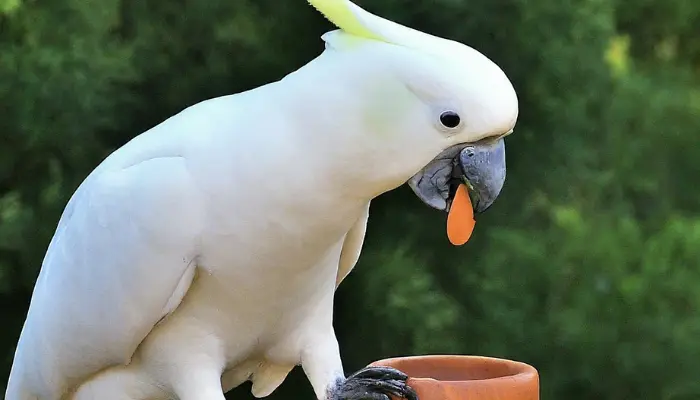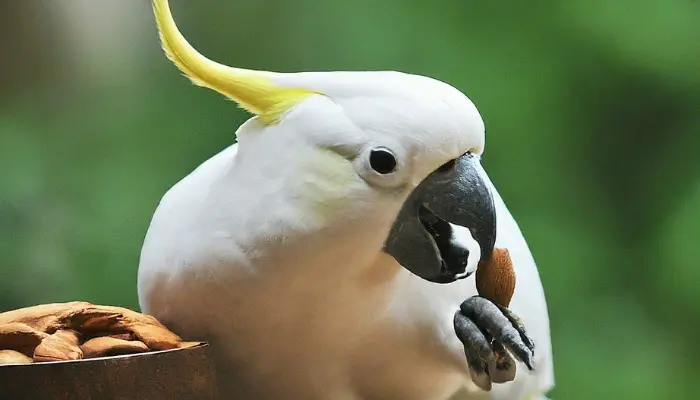Yes, cockatoos can eat almonds, but it is essential to offer them in moderation. Almonds are nutritious for cockatoos, providing healthy fats, protein, and some essential vitamins and minerals. However, they are also high in fat, so too many almonds can lead to weight gain and other health issues for your cockatoo. Make sure the almonds are unsalted and preferably raw or dry-roasted, as salted almonds can be harmful to birds. Additionally, always monitor your cockatoo’s intake of almonds and other treats to ensure they maintain a balanced diet.
Benefits of Almonds for Cockatoos
Almonds offer several benefits for cockatoos when given in moderation.
- Nutritional Value: Almonds contain essential nutrients such as healthy fats, protein, fiber, vitamins (including vitamin E), and minerals (such as calcium, magnesium, and potassium), which are important for the overall health and well-being of cockatoos.
- Energy Source: The fats and protein in almonds provide a good source of energy for cockatoos, helping to support their daily activities and metabolic functions.
- Healthy Feathers and Skin: The vitamin E content in almonds can contribute to maintaining healthy feathers and skin in cockatoos, promoting a shiny coat and reducing the risk of skin problems.
- Antioxidant Properties: Almonds contain antioxidants that can help protect cockatoos from oxidative stress and support their immune system.
- Beak and Beak Conditioning: Chewing on almonds can help keep a cockatoo’s beak trimmed and healthy. The act of cracking open the almond shell provides both mental stimulation and physical exercise for the bird.
- Variety in Diet: Offering almonds as part of a varied diet can prevent boredom and encourage foraging behavior in cockatoos, promoting their overall mental and emotional well-being.
Remember, while almonds offer these benefits, they should only be given as occasional treats and should not replace the balanced diet formulated specifically for cockatoos, which typically includes pellets, fresh fruits, vegetables, and occasionally, small amounts of seeds and nuts. Always monitor your cockatoo’s intake and consult with a avian veterinarian for specific dietary recommendations.

Nutrients in Almonds
Almonds are a powerhouse of nutrients, offering a range of health benefits. Here’s a breakdown of the key nutrients found in almonds.
- Protein: Almonds are a good source of plant-based protein, containing about 6 grams of protein per ounce (28 grams). Protein is essential for muscle repair, growth, and overall health.
- Healthy Fats: Almonds are high in monounsaturated and polyunsaturated fats, including omega-3 and omega-6 fatty acids. These fats are beneficial for heart health, lowering bad cholesterol levels (LDL) and reducing the risk of heart disease.
- Fiber: Almonds are rich in dietary fiber, with about 3.5 grams of fiber per ounce. Fiber aids digestion, promotes satiety, and helps regulate blood sugar levels.
- Vitamin E: Almonds are one of the best sources of vitamin E, with just one ounce providing over 7 milligrams, which is around 37% of the recommended daily intake. Vitamin E is a powerful antioxidant that helps protect cells from damage caused by free radicals.
- Magnesium: Almonds are an excellent source of magnesium, containing about 76 milligrams per ounce. Magnesium is involved in hundreds of biochemical reactions in the body, including energy production, nerve function, and muscle contraction.
- Calcium: Almonds are a good source of calcium, containing around 76 milligrams per ounce. Calcium is essential for strong bones and teeth, as well as for nerve transmission and muscle function.
- Phosphorus: Almonds are rich in phosphorus, with about 136 milligrams per ounce. Phosphorus plays a crucial role in bone health, energy metabolism, and DNA synthesis.
- Iron: Almonds contain a moderate amount of iron, providing about 1 milligram per ounce. Iron is necessary for the formation of hemoglobin, which carries oxygen in the blood, as well as for energy production and immune function.
- Zinc: Almonds contain small amounts of zinc, an essential mineral that supports immune function, wound healing, and DNA synthesis.
- vitamins B: Almonds contain various B vitamins, including riboflavin (vitamin B2), niacin (vitamin B3), and folate (vitamin B9), which are important for energy production, metabolism, and overall health.
In addition to these nutrients, almonds also contain phytochemicals such as flavonoids and phenolic compounds which have antioxidant and anti-inflammatory properties. Including almonds in your diet can contribute to overall health and well-being.
Conclusion
Almonds are great for cockatoos in small amounts offering a bunch of nutrients like protein and healthy fats. They are good for feathers, skin, and mental stimulation. But remember, they are treats not the main meal. Cockatoos need a balanced diet with pellets, fruits, and veggies. Keep an eye on how much they eat, and talk to a bird vet for the best diet plan.
